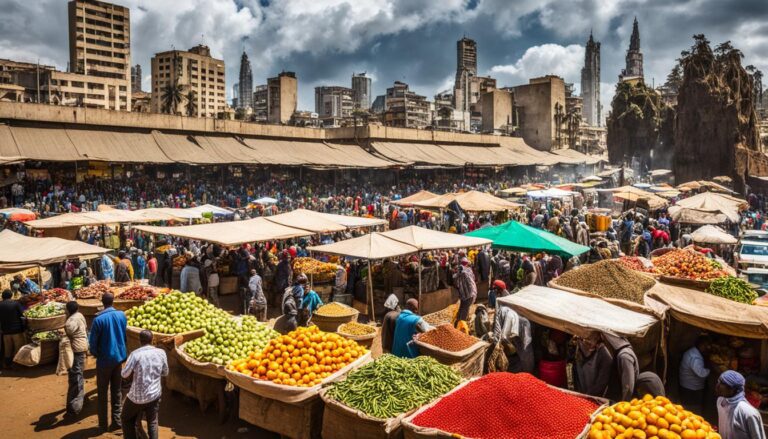How Do Ethiopians Celebrate New Year?
Traditional Ethiopian New Year Celebrations
Ethiopians celebrate their New Year, known as Enkutatash, with vibrant and colorful festivities that are deeply rooted in their rich cultural heritage. Enkutatash falls on September 11th or 12th in the Gregorian calendar, marking the end of the rainy season and the beginning of the harvest season in Ethiopia.
One of the most significant traditions during the Ethiopian New Year is the exchanging of bouquets of yellow flowers and greenery among friends and family members. This gesture symbolizes a fresh start and a peaceful, prosperous new year ahead. It is common to see people dressed in traditional Ethiopian attire, adding to the festive and joyful atmosphere of the celebrations.
Throughout communities in Ethiopia, there are often musical performances, traditional dances, and cultural events organized to commemorate the New Year. These celebrations bring people together to share in the joy of new beginnings and express gratitude for the blessings of the past year.
Family gatherings play a central role in Ethiopian New Year celebrations, with loved ones coming together to enjoy special meals and exchange gifts. Traditional dishes such as injera (a sourdough flatbread) and doro wat (spicy chicken stew) are commonly prepared during this time, adding a taste of authenticity to the festivities.
As the sun sets on the eve of the New Year, bonfires are lit in many communities as a symbolic gesture to bid farewell to the previous year’s challenges and welcome the opportunities and blessings of the year to come. Elders often share stories and wisdom with the younger generations during these gatherings, passing down cultural traditions and values.
Ethiopian New Year celebrations are a time of unity, reflection, and renewal. The colorful customs, delicious foods, lively music, and warm hospitality that characterize these festivities make Enkutatash a truly special and cherished holiday in Ethiopian culture.
Significance of the New Year in Ethiopian Culture
Ethiopian New Year, known as Enkutatash, holds significant cultural and religious importance in Ethiopian society. Celebrated on September 11th (or September 12th in leap years), the holiday marks both the end of the rainy season and the beginning of the new year according to the Ethiopian calendar. This calendar, derived from the Egyptian Coptic calendar, is nearly 7-8 years behind the Gregorian calendar, placing the current year in Ethiopia around 2013.
Enkutatash is a time of joy and festivity, where families and friends come together to celebrate the end of one year and the fresh start of another. The holiday is deeply rooted in the Ethiopian Orthodox Christian faith, with special religious observances and prayers taking place in churches across the country. In addition to its religious significance, Enkutatash also symbolizes renewal, hope, and the promise of a prosperous year ahead.
One of the most iconic aspects of Enkutatash is the tradition of giving and receiving gifts. Known as “Melkam Addis Amet,” which translates to “Happy New Year,” gifts such as flowers and small trinkets are exchanged between loved ones as a symbol of goodwill and blessing for the new year. This tradition reinforces the importance of community, generosity, and unity within Ethiopian culture.
Another essential element of Enkutatash is the custom of traditional coffee ceremonies. Coffee plays a central role in Ethiopian culture, and during the New Year celebrations, families gather to partake in elaborate coffee ceremonies that involve roasting, grinding, and brewing coffee beans. This ritual signifies hospitality, friendship, and the sharing of blessings with one another.
The significance of the New Year in Ethiopian culture goes beyond just a change in the calendar. It represents a time of spiritual reflection, cultural pride, and communal togetherness. Enkutatash serves as a reminder of the rich traditions and values that have been passed down through generations, and it continues to be a cherished holiday that unites Ethiopians both at home and abroad.
Special Ethiopian New Year Foods and Dishes
Ethiopian New Year, known as Enkutatash, is a time for family and friends to come together and celebrate with an array of delicious traditional foods. One of the most iconic dishes prepared during this festive occasion is ‘Doro Wat,’ a spicy chicken stew that symbolizes unity and togetherness. Another popular dish is ‘Injera,’ a sourdough flatbread that serves as the base for most Ethiopian meals. This spongy bread complements various stews and vegetable dishes, creating a unique and flavorful dining experience.
In addition to Doro Wat and Injera, ‘Kitfo’ is another beloved dish often enjoyed during Ethiopian New Year. Kitfo is a minced raw beef dish seasoned with spiced butter and mitmita, a spicy chili powder blend. This delicacy is a favorite among many Ethiopians during the holiday season and is often shared as a symbol of generosity and goodwill.
As part of the New Year’s celebrations, ‘Tibs’ is also a prevalent dish served in Ethiopian households. Tibs consists of sautéed meat, typically beef or lamb, mixed with vegetables such as tomatoes, onions, and peppers. The aromatic blend of spices and tender meat makes Tibs a flavorful and hearty dish that brings warmth and joy to the festive gatherings.
To satisfy the sweet tooth, Ethiopians indulge in ‘Taita,’ a traditional honey wine that is enjoyed during the New Year festivities. This sweet and slightly tangy beverage is a harmonious accompaniment to the rich and savory dishes served during the celebration. Moreover, ‘Ambasha,’ a sweet bread flavored with spices like cardamom and anise, is also a popular treat during Enkutatash, adding a touch of sweetness to the culinary spread.
The Ethiopian New Year is not only a time to mark the end of the rainy season and the beginning of a new harvest, but it is also a time to savor the rich and diverse flavors of Ethiopian cuisine. From spicy stews to hearty bread and sweet delicacies, the special foods and dishes prepared for Ethiopian New Year reflect the country’s vibrant culture and deep-rooted traditions in every mouthwatering bite.
Music and Dance Performances During Ethiopian New Year Festivities
Ethiopian New Year, known as Enkutatash, is a joyous occasion filled with vibrant music and lively dance performances. Music plays a significant role in Ethiopian culture, especially during festive events like the New Year celebrations. Traditional Ethiopian music involves the use of instruments such as drums, masenko (a stringed instrument), krar (a lyre), and kebero (a drum). These instruments come together to create rhythmic beats that accompany the celebratory mood of the festivities.
During the Ethiopian New Year festivities, dance performances are a common sight, with both young and old joining in the celebration. One popular dance style is known as eskista, characterized by intricate shoulder movements, chest pops, and hip sways. The dancers move in sync with the music, creating a mesmerizing display of skill and coordination. In addition to traditional dances like eskista, modern Ethiopian music genres such as Ethio-jazz also make an appearance during the New Year celebrations, blending traditional melodies with contemporary elements.
Music and dance performances are not only a form of entertainment during the Ethiopian New Year but also hold cultural and historical significance. They serve as a means of passing down traditions from one generation to the next, preserving the rich heritage of the Ethiopian people. Through music and dance, Ethiopians express their joy, unity, and deep-rooted connection to their history and ancestors.
The New Year festivities provide a platform for talented musicians and dancers to showcase their skills and creativity, further enriching the cultural tapestry of Ethiopia. Whether it’s the rhythmic beats of traditional instruments or the mesmerizing movements of dancers, music and dance are integral components of Ethiopian New Year celebrations, adding to the festive atmosphere and creating lasting memories for all who partake in the revelries.
Traditional Ethiopian New Year, known as Enkutatash, is a joyous occasion filled with various rituals and customs that hold significant cultural importance. The Ethiopian New Year falls on September 11th according to the Gregorian calendar, which marks the end of the rainy season and the beginning of the spring season. Ethiopians celebrate this day with great enthusiasm, reflecting their rich cultural heritage and strong sense of community.
One of the key rituals observed during the Ethiopian New Year is the gathering of family and friends for a traditional meal. This meal typically includes injera, a sourdough flatbread that serves as the base for various stews and dishes. Doro Wat, a spicy chicken stew, and Alicha, a mild beef stew, are commonly prepared for this special occasion. The meal is shared among loved ones as a symbol of unity and togetherness.
Ethiopian New Year celebrations also feature music and dance performances that showcase the country’s vibrant artistic traditions. Traditional Ethiopian music, characterized by rhythmic drumming and melodic vocal chants, fills the air during these festivities. Dance forms like Eskista, a shoulder dance, and Amhara, a vigorous dance performed by women, add to the festive atmosphere and create a sense of merriment.
Additionally, Ethiopians mark the New Year with various customs that are believed to bring good luck and prosperity in the coming year. One common practice is the burning of dried leaves and branches known as “Chibo” to symbolize the cleansing of the past year’s troubles and to make way for new beginnings. Another custom involves young children going from house to house singing traditional songs and receiving small gifts in return.
As the sun sets on the Ethiopian New Year, communities across the country come together to light bonfires and engage in spirited dancing and drumming. This communal celebration signifies the passing of the old year and the welcoming of the new, filled with hope and optimism for what lies ahead. The Ethiopian New Year encapsulates the spirit of renewal and unity, making it a cherished and much-anticipated event in the Ethiopian cultural calendar.
Conclusion
As Ethiopia celebrates its New Year, the rich tapestry of traditions, customs, and cultural significance creates a vibrant tapestry of celebration. The ancient roots of the festivities are deeply intertwined with Ethiopia’s history, religion, and community bonds. Through traditional celebrations, the Ethiopian New Year is not only a time for merriment but also a moment to honor the past, embrace the present, and look towards the future with hope and positivity.
During the Ethiopian New Year, the air is filled with the aroma of special dishes prepared with care and love. Families come together to share these delectable treats like Doro Wat, injera, and t’ej, symbolizing unity and abundance. These culinary delights not only tantalize the taste buds but also serve as a reminder of the importance of feasting and fellowship during this auspicious time.
Music and dance performances are integral to Ethiopian New Year festivities, bringing joy, rhythm, and a sense of cultural pride to the celebrations. Traditional dances like eskista and kirar music fill the air with energy and enthusiasm, inviting people to join in the revelry and express their joy through movement and melody.
Rituals and customs observed during the Ethiopian New Year play a crucial role in marking the significance of the occasion. From attending church services to engaging in cultural ceremonies such as the burning of bonfires and the brewing of special New Year’s coffee, every ritual is a sacred thread that weaves the fabric of Ethiopian culture and identity.
The Ethiopian New Year is not just a date on the calendar; it is a symbol of renewal, rebirth, and rejuvenation for the Ethiopian people. As they bid farewell to the past year’s challenges and welcome the new year with open arms, Ethiopians embrace the opportunity to start afresh, reconcile differences, and seek blessings for the journey ahead.
In essence, the Ethiopian New Year celebrations embody the values of togetherness, gratitude, and resilience that define the Ethiopian spirit. It is a time of reflection, rejoicing, and reconnecting with one’s roots, heritage, and community. As Ethiopians across the globe come together to commemorate this special occasion, they not only celebrate a new beginning but also affirm their commitment to preserving their cultural heritage for generations to come.





